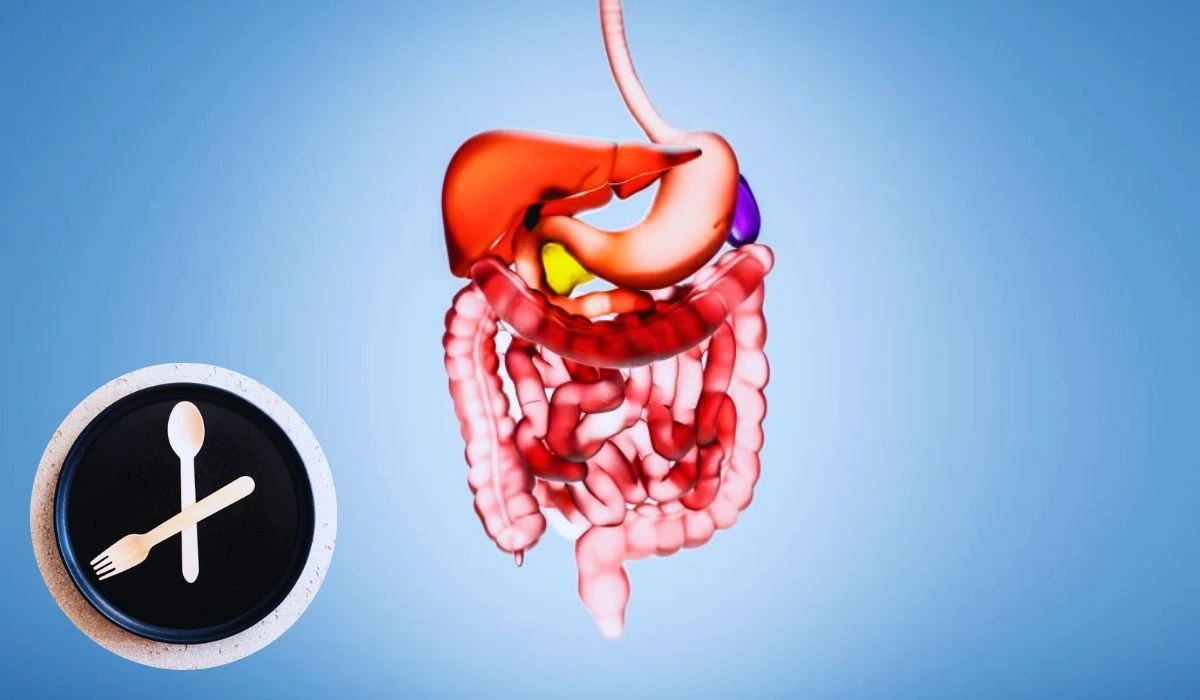Fasting has become an increasingly popular health and wellness trend in recent years. Many people now routinely fast for 16 hours or more per day, often following diets like intermittent fasting or time-restricted eating.
Along with potential benefits for weight loss, metabolic health, and longevity, some evidence suggests that fasting may also improve gut health. This article will examine the potential gut health benefits of fasting and provide tips for implementing a fasting routine safely and effectively.
Benefits Of Fasting For Gut Health

Several studies have found fasting to have beneficial effects on the gut microbiome and integrity of the gastrointestinal tract. Here are some of the top research-backed benefits:
- Promotes growth of beneficial gut bacteria – Fasting gives bacteria like Akkermansia and Bifidobacterium an advantage to thrive, which supports intestinal barrier function.
- Increases gut barrier integrity – Fasting may enhance gut barrier integrity, preventing leaks that expose the gut’s immune system to foreign invaders.
- Reduces inflammation – Some studies show lower markers of inflammation like CRP and pro-inflammatory cytokines during fasting periods. This helps create a balanced gut microbiome.
- Stimulates cellular recycling – Autophagy induced by fasting allows for old, damaged cells to be cleared out and recycled. This keeps the gut lining healthy.
- Discourages overgrowth of bad bacteria – Potentially pathogenic bacteria are deprived of constant nutrients from food during fasting periods.
- Clears metabolic waste – Taking a break from digestion allows the gut to clear out undigested food residues and metabolic waste products.
Also Check: Is It Safe To Lose Weight By Fasting? Here What You Need To Know!
How Does Fasting Help Gut Health?
There are a few key mechanisms by which fasting exerts its beneficial effects on gut health:
- Promotes diversity of microbiome – With no incoming food, bacteria must compete for nutrients in the gut lumen during a fast. This favors the growth of beneficial bacterial strains.
- Reduces metabolic waste buildup – Fasting gives the gut a break from processing food, allowing it to clear out waste products that can irritate the GI lining.
- Enhances gut barrier integrity – Fast-induced autophagy helps recycle damaged cell components in the gut epithelium, maintaining an intact barrier.
- Lowers inflammation – Shifting metabolic modes during fasting reduces inflammatory triggers like reactive oxygen species and lipopolysaccharides.
- Activates cellular repair processes – Fasting switches cells into maintenance mode, up-regulating genes involved in cellular repair and antioxidant defense.
- Discourages overgrowth of pathogens – Potentially harmful bacteria are starved of constant nutrients during fasting periods, preventing overgrowth.
How Long Should You Fast For Gut Health?
While research is still evolving, the general consensus is that a fasting duration of 12-24 hours provides benefits for gut health. Here are some fasting duration recommendations:
- 12-16 hours daily – Following an overnight fast with time-restricted eating in the 8-hour feeding window supports gut homeostasis.
- 24+ hours 1-2 times per week – Monthly or weekly 24-48 hour fasts allow for deeper cellular recycling and waste removal.
- 3-5+ day fasts periodically – Periodic multi-day fasting provides intense gut rest and repair but requires medical guidance.
It’s important to choose a fasting routine that is sustainable long-term based on your lifestyle and health status. Start slowly and work your way up to longer fasts if desired. Pay attention to how your body responds.
Conclusion
A growing pool of research suggests fasting can confer meaningful benefits to gut health. By giving the digestive system a periodic rest, fasting appears to reset gut bacteria, enhance barrier integrity, reduce inflammation, and stimulate cellular repair processes.
Implementing a routine fasting protocol of 12-24 hours in duration can support overall GI function and microbiome balance when paired with an otherwise healthy diet. As with any dietary change, it’s best to start slowly and discuss fasting plans with your healthcare provider, especially if you have any underlying medical conditions.
FAQ
A: Extended fasting is not recommended for children, pregnant women, underweight individuals, or those with certain health conditions without medical supervision. Check with your doctor before fasting if you have any medical concerns.
A: Most experts recommend fasting 1-2 times per week for full-day (24-hour) periods or fasting for 12-16 hours daily to maintain gut health. The frequency depends on the length of the fasting period.
A: Break your fast gradually with hydrating fluids and easily digested foods like broth, vegetables, nuts, eggs, or yogurt. Avoid heavy, greasy, or sugary foods which can shock your system.
A: Light exercise like yoga, walking, or gentle cardio is fine during short fasts under 24 hours. But intense workouts require fuel and hydration, so they aren’t recommended for extended fasting periods.
A: No, fasting promotes a balanced gut microbiome by allowing the growth of beneficial bacteria. Harmful bacteria are suppressed but not entirely eliminated. Healthy bacteria repopulate the gut after fasting.

